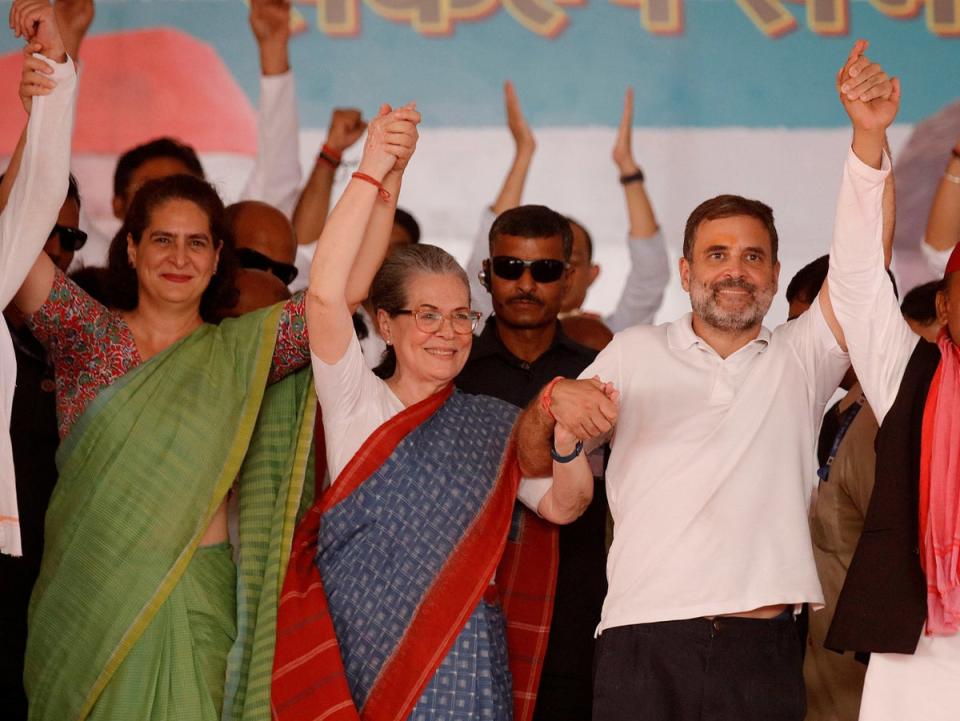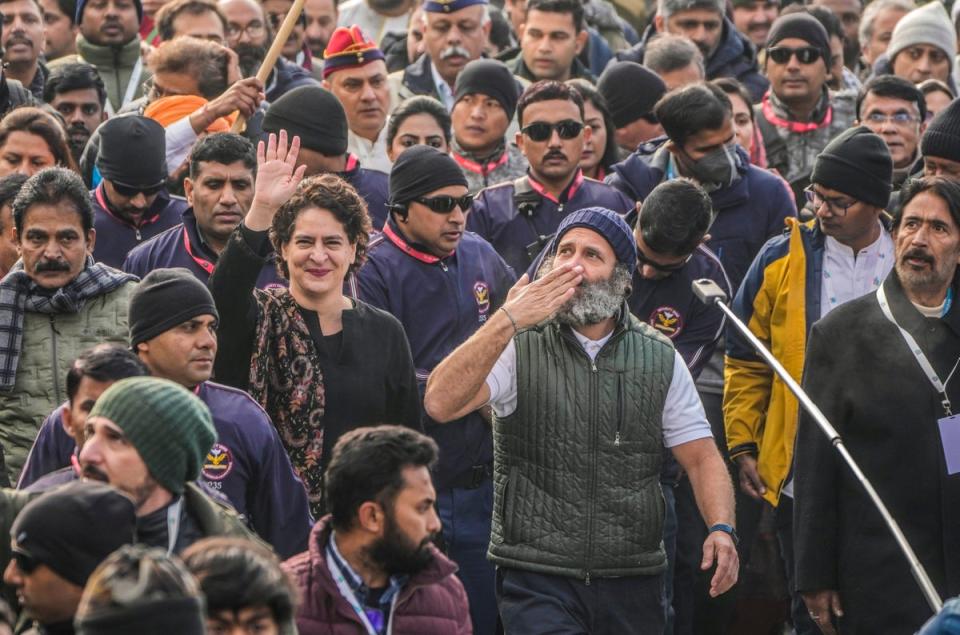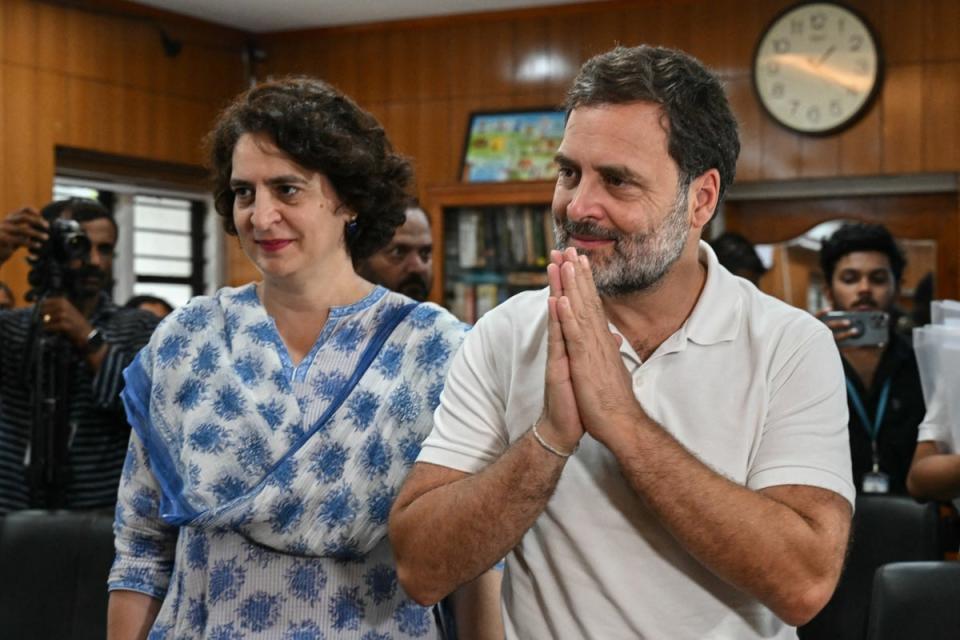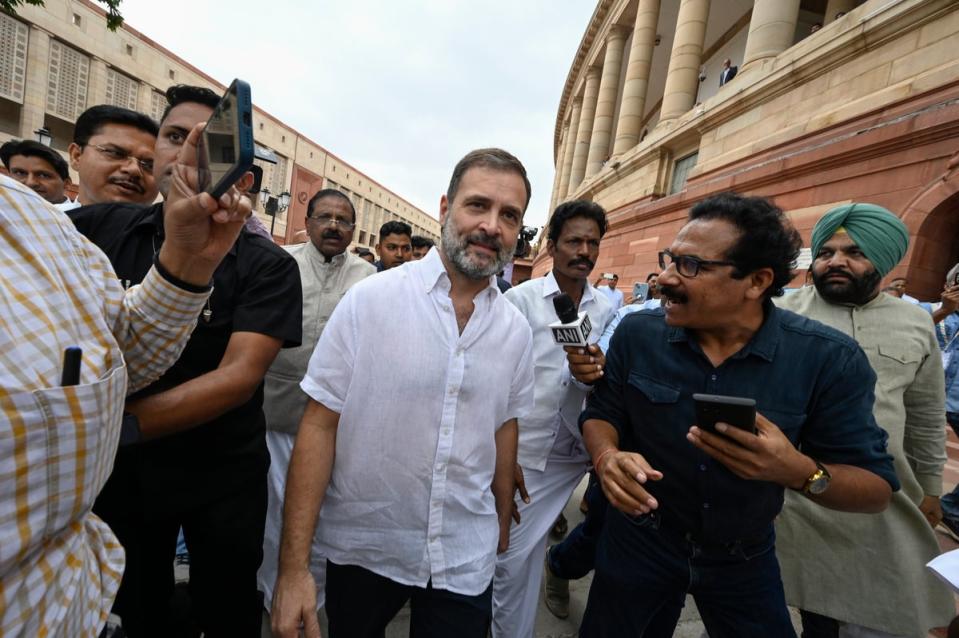Who is Rahul Gandhi – the political dynast considered to be Narendra Modi’s chief rival?
Indian citizens of the country had a choice to make this election season: back Hindu nationalist prime minister Narendra Modi for a rare third term or usher in an alternative?
Rahul Gandhi – the scion of India’s most prominent political dynasty – is often pitched as an alternative candidate.
Mr Gandhi, though he is not officially the leader, is the centre of gravity of the Congress, the primary opposition to Mr Modi’s ruling Bharatiya Janata Party (BJP).
Mr Gandhi is comfortably ahead of his rival in Rae Bareli. He is also contesting his current seat in Wayanad, Kerala, where he has a comfortable lead over Annie Raja of Communist Party of India. In India, people can contest multiple seats and must choose only one to take up as an MP.
Follow our live coverage for 2024 Indian elections.
He belongs to the Gandhi family, the most prominent of India’s many political dynasties whose members have ruled the republic for nearly half of its existance. His great-grandfather, Jawaharlal Nehru, was India’s first prime minister and his grandmother, Indira Gandhi, and father, Rajiv Gandhi, both held the post subsequently. Indira Gandhi was also India’s first woman PM.
After Mr Gandhi’s father was assassinated in 1991, his Italian-born mother, Sonia Gandhi, rose to lead the Congress.
She was widely seen as being the power behind the throne when the party returned to office in 2004 and governed for a decade.

By the time Mr Modi took power in 2014 – riding a wave of public anger against a Congress regime beset with multiple corruption scandals – Mr Gandhi had emerged as the leader of the opposition party and, thus, the main challenger to the prime minister.
Although his party suffered many electoral setbacks since and lost its national dominance to the BJP – Mr Gandhi quit as the Congress chief after a crushing defeat to Mr Modi in the 2019 election – he’s still regarded as the chief opposition leader.
In which role he has challenged Mr Modi over his Hindu nationalist government’s handling of the increasing persecution of religious minorities, corruption, crony capitalism, rising inflation, erosion of democratic values, especially secularism, and rural agrarian distress.
Mr Gandhi undertook a crosscountry walkathon last year, called Bharat Jodo Yatra (Unite India March), walking from Tamil Nadu in the south to Kashmir in the north and, then earlier this year, from east to west, engaging tens of thousands of citizens and galvanising the opposition.
In all, the parliamentarian walked over 10,000km to rally the country against Mr Modi and his ruling party’s “divisive politics”.

In recent months, he has also attacked the federal government for failing to stop bloodshed in the northeastern state of Manipur, which has been riven by sectarian violence since last year.
“This election is fundamentally different. I don’t think democracy has been at as much at risk, the constitution has been at as much risk as it is today,” Mr Gandhi declared early this month while campaigning for the elecion alongside his sister Priyanka Gandhi Vadra, herself a prominent Congress leader.

Mr Gandhi is contesting from his Wayanad constituency in southern Kerala state where he enjoys popularity.
As the elections have drawn near, Mr Gandhi has ramped up his attacks on the prime minister. At a campaign rally in Kerala’s Kozhikode on 16 April, he described Mr Modi as “an instrument of five or six of India’s biggest and richest businessmen”.
Mr Gandhi has been leading the opposition’s charge at a time when Mr Modi’s ruling party has been accused of employing the state machinery, particularly the criminal justice system, to crack down on its rivals. In the last few years, federal agencies have investigated, raided or arrested several leading opposition figures, and even jailed some, notably Delhi chief minister Arvind Kejriwaland former Jharkhand chief minister Hemant Soren.
Mr Gandhi himself was shunted out of parliament after a lower court convicted him of defamation for allegedly “mocking” the Modi surname in a 2019 campaign speech.
Mr Gandhi had asked: “Why do all thieves have Modi as their surname?” He was referring to Nirav Modi, a fugitive diamond tycoon, Lalit Modi, a former Indian Premier League chief banned for life by the country’s cricket for alleged corruption, and prime minister Modi.
He was reinstated five months later after the Supreme Court suspended his conviction.

More recently, Mr Gandhi’s party has seen its bank accounts frozen over a tax dispute. The party’s president, Mallikarjun Kharge, said tax authorities have demanded 35bn rupees ($426m) from the party in unpaid dues.
It is in this political climate that Mr Gandhi is seeking to dislodge Mr Modi’s seemingly iron grip on power. To this end, the Congress has cobbled together a broad alliance with regional parties called the Indian National Developmental Inclusive Alliance, INDIA for short and effect.
The coalition has developed cracks in recent months, but it still enjoys backing from major political players in northern, southern and western India that have regional dominance against Mr Modi.
INDIA has vowed to build a more secular and inclusive society by reversing what its supporters have described as the BJP’s Hindu majoritarianism outlook, which has resulted in rising persecution of Muslims, Christians and lower caste Hindus as well as a shrinking space for dissent and free media.
They have argued that another term for Mr Modi would mean an end to India’s status as a secular, democratic country.
If and how this message clicks with India’s Hindu majority in particular will likely determine the success of Mr Gandhi and his coalition in the impending elections.


